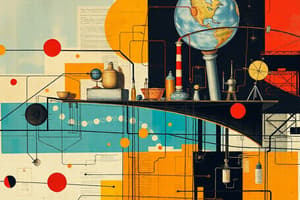Podcast
Questions and Answers
What form of energy is causing the decomposition reactions in black and white photography?
What form of energy is causing the decomposition reactions in black and white photography?
Light energy
Why is the amount of gas collected in one of the test tubes in Activity 1.7 double that of the other? Name this gas.
Why is the amount of gas collected in one of the test tubes in Activity 1.7 double that of the other? Name this gas.
The gas collected is hydrogen. The amount is double due to the decomposition of water into hydrogen and oxygen gas during the electrolysis process.
Name the substance used for white washing and write its formula. Also, provide the reaction of this substance with water.
Name the substance used for white washing and write its formula. Also, provide the reaction of this substance with water.
The substance used for white washing is slaked lime with the formula Ca(OH)2. The reaction of slaked lime with water is: Ca(OH)2 + H2O -> Ca(OH)2
Give two examples of oxidation with gain of oxygen.
Give two examples of oxidation with gain of oxygen.
Give two examples of reduction with loss of oxygen.
Give two examples of reduction with loss of oxygen.
Why do we apply paint on iron articles?
Why do we apply paint on iron articles?
Why are oil and fat containing food items flushed with nitrogen?
Why are oil and fat containing food items flushed with nitrogen?
Give one example of corrosion and one example of rancidity.
Give one example of corrosion and one example of rancidity.
What is the purpose of Activity 1.1 in the text?
What is the purpose of Activity 1.1 in the text?
Why is it important to clean the magnesium ribbon before burning it in Activity 1.1?
Why is it important to clean the magnesium ribbon before burning it in Activity 1.1?
What caution is provided before performing Activity 1.1?
What caution is provided before performing Activity 1.1?
What is the significance of observing the magnesium ribbon burning in Activity 1.1?
What is the significance of observing the magnesium ribbon burning in Activity 1.1?
Flashcards are hidden until you start studying
Study Notes
Black & White Photography
- Light energy drives the decomposition reaction in black and white photography.
- Silver halide salts make up the film.
- Light decomposes the silver halide salts, causing the formation of a silver image.
Activity 1.7
- In Activity 1.7, the volume of gas collected in one test tube is double that of the other because the water is decomposed into hydrogen and oxygen.
- The gas collected in the tube with double the volume is hydrogen.
- Oxygen gas is collected in the other test tube.
Whitewashing
- Calcium oxide or quick lime (CaO) is used for whitewashing.
- Calcium oxide reacts with water to form calcium hydroxide (Ca(OH)2), releasing a significant amount of heat, resulting in a white paste.
- The reaction is: CaO + H₂O → Ca(OH)₂
Oxidation
- Oxidation is a chemical reaction involving the gain of oxygen.
- Example 1: Rusting of iron. Iron reacts with oxygen to form iron oxide (rust).
- Example 2: Burning of fuels. The carbon in fuels combines with oxygen to form carbon dioxide.
Reduction
- Reduction is a chemical reaction involving the loss of oxygen.
- Example 1: The formation of copper when copper oxide is heated with carbon.
- Example 2: The formation of metallic iron when iron oxide is heated with carbon.
Iron Articles
- Iron reacts with oxygen and moisture in the air, forming iron oxide (rust).
- Rust weakens the iron, resulting in corrosion.
- Applying paint forms a protective barrier, preventing iron's contact with oxygen and moisture.
Food Items (Oil, Fat)
- Nitrogen is used to flush oil and fat containing food items to prevent rancidity.
- The oxygen in the air oxidizes the unsaturated fats, resulting in a change in taste and smell, a process called rancidity.
- Nitrogen is an inert gas, preventing oxidation reactions.
Corrosion and Rancidity
- Corrosion is a type of degradation of materials by chemical reactions with the environment.
- Rusting of iron is an example of corrosion.
- Rancidity involves the deterioration of food due to oxidation.
- The development of rancid notes in fats and oils is an example of rancidity.
Activity 1.1
- Activity 1.1 is designed to observe a chemical reaction: the burning of magnesium ribbon.
- Cleaning the magnesium ribbon is important to ensure a clean combustion reaction and avoid contamination by other materials.
- Caution is provided to wear eye protection as the burning magnesium ribbon produces intense light that could cause eye damage.
- Observing the magnesium ribbon burning in activity 1.1 demonstrates the chemical reaction of magnesium reacting with oxygen, producing magnesium oxide.
- Magnesium oxide is a white powder formed as a result of the burning process.
Studying That Suits You
Use AI to generate personalized quizzes and flashcards to suit your learning preferences.




